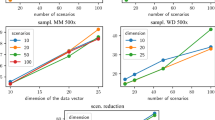Abstract
Data for optimization problems often comes from (deterministic) forecasts, but it is naïve to consider a forecast as the only future possibility. A more sophisticated approach uses data to generate alternative future scenarios, each with an attached probability. The basic idea is to estimate the distribution of forecast errors and use that to construct the scenarios. Although sampling from the distribution of errors comes immediately to mind, we propose instead to approximate rather than sample. Benchmark studies show that the method we propose works well.














Similar content being viewed by others
Notes
Usually one described by a system of stochastic differential equations (Wiener, Lévy, \(\dots \)) or by a discrete time series (ARMA, VARMA, \(\dots \)).
References
Carrión M, Arroyo JM (2006) A computationally efficient mixed-integer linear formulation for the thermal unit commitment problem. Power Syst IEEE Trans 21(3):1371–1378
Dupačová J, Consigli G, Wallace SW (2000) Scenarios for multistage stochastic programs. Ann Oper Res 100:25–53
Eichhorn A, Heitsch H, Römisch W (2010) Stochastic optimization of electricity portfolios: scenario tree modeling and risk management. In: Rebennack S, Pardalos PM, Pereira MVF, Iliadis NA (eds), Handbook of power systems II, Energy systems, pp 405–432. Springer, Berlin
Ela E, Milligan M (2011) A flexible power system operations simulation model for assessing wind integration. In: Power and energy society general meeting, 2011 IEEE, pp 1–8
Feng Y, Gade D, Ryan SM, Watson J-P, Wets RJ-B, Woodruff DL (2013) A new approximation method for generating day-ahead load scenarios. In: Proceedings of the 2013 IEEE power and energy society general meeting
Feng Y, Rios I, Ryan SM, Spürkel K, Watson J-P. Wets RJ-B, Woodruff DL (2015) Toward scalable stochastic unit commitment; part 1: load scenario generation, Energy systems, to appear
Høyland K, Wallace SW (2003) Generating scenarios for multistage decision problems. Manag Sci, 47(2)
Kaut M, Wallace SW (2007) Evaluation of scenario-generation methods for stochastic programming. Pacific J Optim 3(2):257–271
King AJ, Wallace SW, Kaut M (2012) Scenario-tree generation. In: King AJ, Wallace SW Modeling with stochastic programming, Springer, pp 77–102
Mak W-K, Morton DP, Wood RK (1999) Monte carlo bounding techniques for determining solution quality in stochastic programs. Oper Res Lett 24:47–56
Pranevicius H, Sutiene K (2007) Scenario tree generation by clustering the simulated data paths. In: Proceedings 21st European conference on modelling and simulation
Royset JO, Wets RJ-B (2013) Epi-splines and exponential epi-splines: pliable approximation tools. Technical report, Naval Postgraduate School
Royset JO, Wets RJ-B (2013) Fusion of soft and hard information in nonparametric density estimation. Technical report, Naval Postgraduate School
Royset JO, Wets RJ-B (2014) Multivariate epi-splines and evolving function identification. Univ. California, Mathematics, Technical report
Ryan SM, Silvia-Monroy C, Watson J-P, Wets RJ-B, Woodruff DL (2013) Toward scalable, parallel progressive hedging for stochastic unit commitment. In: Proceedings of the 2013 IEEE power and energy society general meeting
Schütz P, Tomasgard A, Ahm S (eds) (2009) Supply chain design under uncertainty using sample average approximation and dual decomposition. Eur J Oper Res 199:409–419
Shapiro A (2003) Monte carlo sampling methods. In: Ruszczynski A, Shapiro A (eds), Stochastic programming, volume 10 of handbooks in operations research and management science, Elsevier, pp 353–425
Snapp S (2010) Leading indicator forecasting in spp
Xu D, Chen Z, Yang L (2012) Scenario tree generation approaches using k-means and lp moment matching methods. J Comput Appl Math 236(17):4561–4579
Author information
Authors and Affiliations
Corresponding author
Additional information
R. J-B. Wets contributions were partially supported by the U.S. Army Research Laboratory and the U.S. Army Research Office under grant W911NF-12-1-0273.
Rights and permissions
About this article
Cite this article
Rios, I., Wets, R.JB. & Woodruff, D.L. Multi-period forecasting and scenario generation with limited data. Comput Manag Sci 12, 267–295 (2015). https://doi.org/10.1007/s10287-015-0230-5
Received:
Accepted:
Published:
Issue Date:
DOI: https://doi.org/10.1007/s10287-015-0230-5




